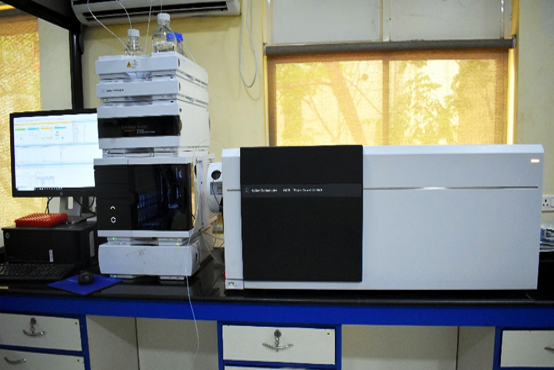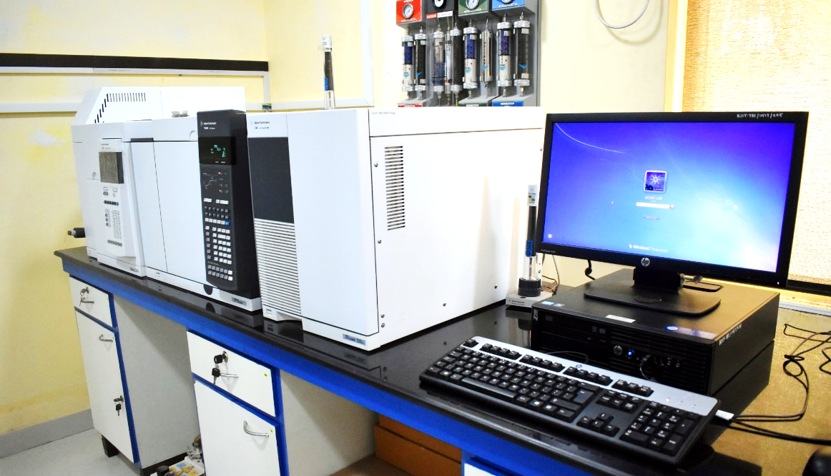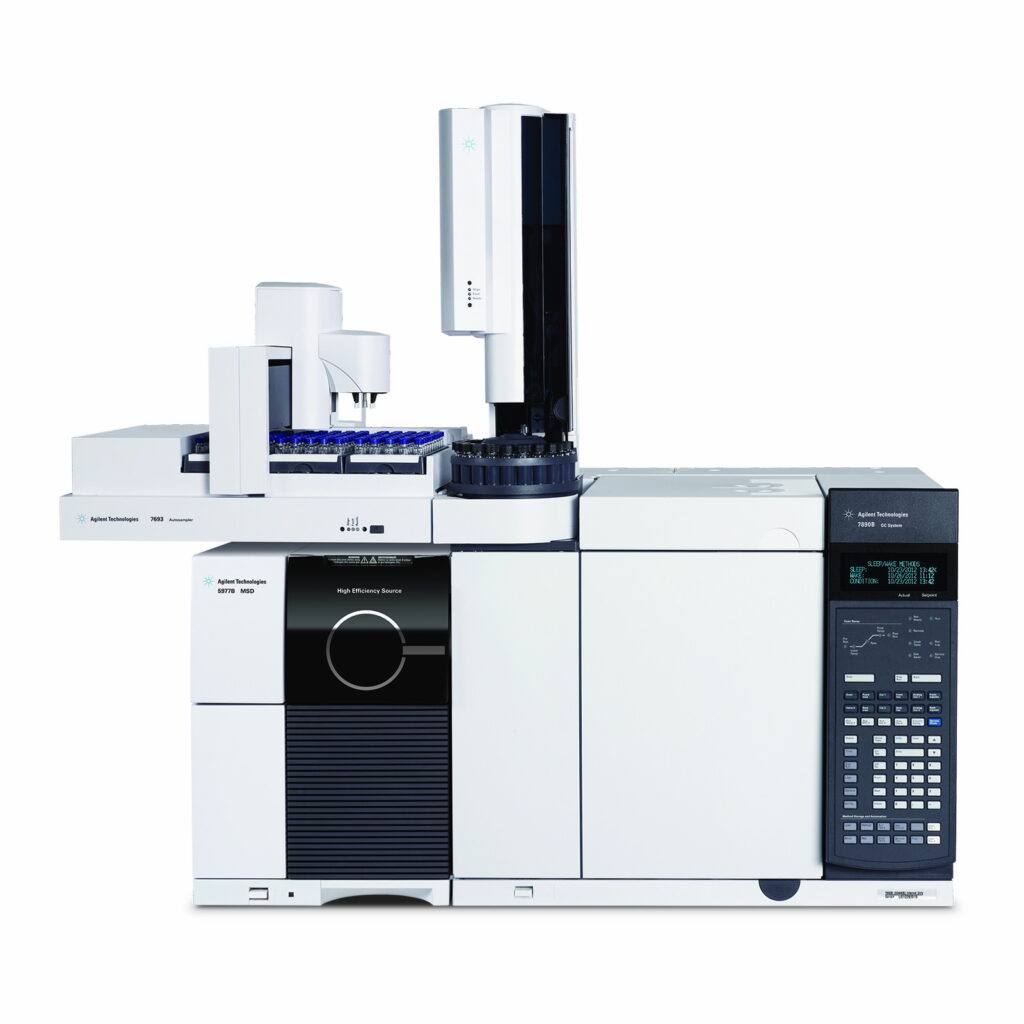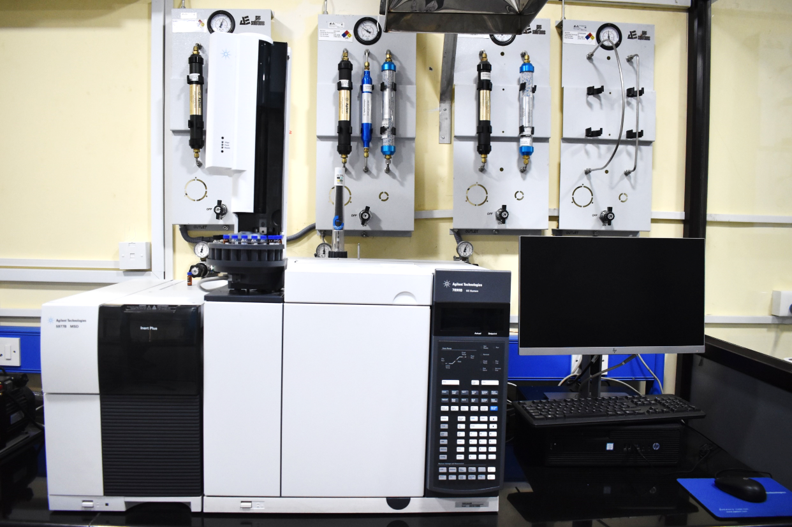Analytical Testing Facility
A Few Words About
Our laboratory
Analytical laboratory technologies and expertise that delivers detailed chemical information about your samples and products for R&D and resolving issue
Agilent 6420 Triple Quadrupole LC/MS System

The 6420 Triple Quadrupole LC/MS System offers great productivity for routine quantitative assays with rugged performance, unmatched reliability and the lowest overall cost of ownership in the Agilent Triple Quadrupole product portfolio. The 6420 provides a fast and robust solution for simultaneously quantifying, screening, and confirming analytes using triggered MRM (tMRM).
The Agilent 6420 Triple Quadrupole LC/MS is engineered to be a workhorse system for labs that perform large numbers of quantitative assays. Updated electronics allow high speed data acquisition and fast polarity switching making the instrument an ideal choice for fast separations and high throughput analyses of diverse compound types.
- Ionisation Sources: ESI, APCI, APPI ,
- Detector: Electron multiplier
- Mass accuracy within 1 ppm; m/z (z=1) less than 500
- Mass Analyzer: Quadrupole Time Of Flight (QTOF)
- MS/MS accuracy within 2 ppm
- S/N ratio of 450:1
- Resolution of 20,000 at m/z 1522
- High Femtogram level sensitivity, I pg at m/z 609
- Dynamic range of up to five orders
- Ability to scan multiple precursor ions ~50
- Rapid polarity switching of 1.5 sec
- Scan rates of 50 Hz
- Positive to negative ion modes
Agilent 6530 Q-TOF LC/MS System
Raise your analysis to a new level with the Agilent 6530 Q-TOF mass spectrometer. Full MS spectra followed by MS/MS or All Ions acquisition make this instrument suitable for applications in the pharmaceutical industry as well as life sciences and governmental agencies. Accurate mass spectrometry enables you to gain more confidence in your analysis compared to unit resolution instrumentation.
The 6530 Q-TOF LC/MS delivers the power of accurate-mass mass spectrometry, so you can be fully confident of your data. All software workflows from our high-end and mid-range instruments are fully compatible with the 6530, giving you the most powerful access to your data and research possible. The demonstrated robustness of the 6530 will keep your lab up to speed.
- Mass Analyzer: Triple Quadruple
- Ionisation Sources: ESI, CI, AJS
- Detector: Electron multiplier
- Mass accuracy within 1 ppm; 0.1 Da from 5-1000 m/z
- MS/MS accuracy :0.01% from 1000-2000 m/z
- S/N ratio of 600:1
- Resolution of 0.7 Da at m/z 1000
- High Femtogram level sensitivity, I pg CAP at m/z 321
- Dynamic range of up to Six orders
- Ability to scan multiple precursor ions ~60
- Rapid polarity switching of 30 ms
- Scan rates of 50 Hz

GC MS ION TRAP With Headspace Sampler (7890B, 7697A, 240-GC MS ION TRAP With Headspace)

The 7890B Gas Chromatograph (GC) System is the world’s most widely used GC system, featuring accurate temperature controls, precise injection systems, and high performance Electronic Pneumatic Control (EPC) modules for good retention time and area count repeatability.
- Ion preparation techniques can be performed after ionization but before ion analysis. These include
- Selected Ion Storage (SIS)
- Tandem Mass Spectrometry
- MS/MS
- Multiple Reaction Monitoring (MRM)
- Mass range :50-500 m/z
- IDL sensitivity : 100 fg OFN 272-222 m/z
Agilent ICP-OES 5100
The Agilent 5100 ICP-OES is a breakthrough chemical analysis instrument used in countless applications from solving crimes in forensic science and discovering new mineral resources, to controlling quality in food production and pollution levels in water supplies.
The device determines the breakdown of elements in a sample solution by superheating it to 9000C using an argon gas plasma, and then measuring the specific wavelength and brightness of the heated molecules to establish the precise concentration of target elements.
- Fast Automated Curve-fitting Technique (FACT) or Inter Element Correction (IEC) technique for spectral interference correction.
- IntelliQuant allows rapid identification of all elements in a sample and their relative concentration. Ideal for method development, troubleshooting and sample screening
- 4Hr Long Term Stability with complex matrix
- 50% Lower power and 50% lower exhaust requirements.
- 27MHz Solid State RF
- 167 to 785 nm wavelength range
- ICP Expert 7 software
- Cool Cone Interface
- Vertically orientated torch
- 400mm focal length thermostatted to +35°C

Agilent HPLC with DAD, FLD Detector 1260 INFINITY II

The Agilent 1200 series HPLC System guarantees the most efficient mixing and pulse-free solvent delivery for consistently fast and accurate results. The system’s optimized design using a quaternary pump allows variable stroke volumes for stable solvent flow. This electronically activated inlet valve runs synchronous to the pistons to eliminate vapor formation in volatile solvent, making the Agilent 1200 both remarkably easy-to-use and maintenance-free. It also features a high-speed proportioning valve and a pre-configured degasser, which allow convenient low-pressure mixing and a large solvent choice flexibility. The HPLC System’s vacuum degasser ensures reduced operating costs without the use of helium and optimum instrument performance.
- Standard Max-Light cartridge cell with 10 mm optical path length provides high sensitivity (noise: <±3 µAU) and low peak dispersion for 2.1, 3.0, and 4.6 mm id columns
- Programmable slit from 1 to 8 nm provides optimum incident light conditions for rapid optimization of sensitivity, linearity, and spectral resolution
- Less baseline drift for more reliable and robust peak integration
- Simultaneous detection of up to eight signals for increased sensitivity and selectivity
- Wide linear range (typically up to 2.5 AU) for reliable, simultaneous quantification of primary compounds, by products, and impurities
- Upgrade option to 1290 Infinity II HDR DAD solution provides 30 times wider linear range for samples with widely different concentration level
- 74 Hz data rate ensures reliable and reproducible integration of narrow peaks
- A simplified optical design provides excellent baseline stability
- Lowest limits of detection – with a Raman S/N > 3000 (using dark signal noise reference)
- Fast and easy maintenance – easy front access and optimized housing and door design enables fast inspection or exchange of the flow cell
- Documentation of instrument parameters – automatic recognition of all flow cell cartridges provides documentation of instrument parameters and helps to comply with GLP
- Extensive analytics, error detection, and display – with Agilent 1200 Series Instant Pilot controller and Agilent Lab Advisor software.
- Inbuilt with Manual Sampler
Agilent 7010B Triple Quadrupole GC/MS System 8890, 7010 B GC/TQ
The new Agilent 7010C triple quadrupole GC/MS is the most sensitive instrument of the Agilent GC/TQ portfolio. For applications that demand the most sensitivity, like the analysis of dioxins and furans, the 7010C GC/TQ equipped with the high-efficiency ion source (HES) is the best fit with low limits of detection down to the attogram level.
- Ion preparation techniques can be performed after ionization but before ion analysis. These include
- Selected Ion Storage (SIS)
- Tandem Mass Spectrometry
- MS/MS
- Multiple Reaction Monitoring (MRM)
- Mass range :50-500 m/z
- IDL sensitivity : 100 fg OFN 272-222 m/z

Agilent GC FID with MS Detector 7890 B ,5977 B

The 7890B Gas Chromatograph (GC) System is the world’s most widely used GC system, featuring accurate temperature controls, precise injection systems, and high performance Electronic Pneumatic Control (EPC) modules for good retention time and area count repeatability.
- Retention Time Locking (RTL) maintains exact retention times from injection to injection, column to column, instrument to instrument, and lab to lab
- Capillary Flow Technology (CFT) provides unique instrument capabilities, such as multi-dimension gas chromatography (GC-GC/Deans Switch), comprehensive two-dimension gas chromatography (GCxGC) with flow modulation, and backflush at the beginning, middle, or end of the analytical column
- Single filament TCD that does not require a separate reference gas, does not require manual potentiometer adjustment, and provides a stable baseline with a minimal amount of signal drift
- Auto-ranging FID provides the ability to detect and quantitate from parts per billion (ppb) to parts per thousand in a single injection
- Integrated SCD/NCD (sulfur or nitrogen chemiluminescence detector) provides low ppb detection, equi-molar response, and quantitation for sulfur or nitrogen contaminants without quenching from matrix
- Helium conservation module and alternative carrier gas solutions dramatically reduce the amount of helium used to offer flexibility and cost savings for your laboratory
- Large Valve Oven (LVO) allows for the combination of multiple methods and simplified maintenance
- Multimode inlet (MMI) serves as a programmable temperature vaporizing injector with flexible capabilities
- Agilent Inert Flow Path provides increased sensitivity for active compounds, from injection to detection
- Low Thermal Mass (LTM) modules, up to 4 installed and operating, increase sample throughput with rapid column heating and cooling
Agilent 7010B Triple Quadrupole GC/MS System 8890, 7010 B GC/TQ
The 7010B Triple Quadrupole GC/MS is the latest version of the first compact benchtop Triple quad (MS/MS) system to provide attogram detection limits in Electron Ionization (EI) mode.
The 7010B is now even easier to use and more efficient than ever, due to its new Dynamic MRM (dMRM) mode of acquisition.
- Dimensions in ms (WxDxH):(35cm*86cm*47cm)
- Dimensions in GC (WxDxH): (58 cm*54cm*57cm)
- IDL sensitivity : 1 µL of 100 fg/µL of OFN produces
- >30,000:1 RMS S/N for the transition of m/z 272-222
- Ion source :HES EI source
- Mass range :m/z 10 to 1050
- Mode of operation : EI standard
- Scan Speed :< 20000 Da/S
- MRM speed :800 MRM transitions/s
- Minimum MRM Dwell time :0.5ms
- Detector: Agilent triple axis HED EM extended
- Scan rate : up to 20000 u/S
- Resolution : 0.7 to 2.5 dalatons
- Software :Mass hunter

Agilent HPLC with DAD, RID Detector1260 INFINITY II

The 1260 Infinity II RID is an HPLC refractive index detector (RID) detector that provides excellent performance for entry-level UHPLC and HPLC differential refractometer (DRI) experiments.
Rapid equilibration times and stable baselines make it easy to analyze carbohydrates, triglycerides, organic acids, and pharmaceutical excipients. The 1260 Infinity II RID is the detector of choice for polymer characterization using gel permeation chromatography (GPC) and size exclusion chromatography (SEC).
- Standard Max-Light cartridge cell with 10 mm optical path length provides high sensitivity (noise: <±3 µAU) and low peak dispersion for 2.1, 3.0, and 4.6 mm id columns
- Programmable slit from 1 to 8 nm provides optimum incident light conditions for rapid optimization of sensitivity, linearity, and spectral resolution
- Less baseline drift for more reliable and robust peak integration
- Simultaneous detection of up to eight signals for increased sensitivity and selectivity
- Wide linear range (typically up to 2.5 AU) for reliable, simultaneous quantification of primary compounds, by products, and impurities
- Upgrade option to 1290 Infinity II HDR DAD solution provides 30 times wider linear range for samples with widely different concentration level
Agilent HPLC Manual With DAD, FLD Detector1260 INFINITY II
The 1260 Infinity II Variable Wavelength Detector enables highest productivity with fast analysis at up to 120 Hz data rates. Even more sample information can be acquired in dual-wavelength mode. Time-programmable wavelength switching provides optimum sensitivity and selectivity for your applications.
Lowest baseline noise and drift results in lowest detection limits for robust quantification of trace level components.
- Standard Max-Light cartridge cell with 10 mm optical path length provides high sensitivity (noise: <±3 µAU) and low peak dispersion for 2.1, 3.0, and 4.6 mm id columns
Programmable slit from 1 to 8 nm provides optimum incident light conditions for rapid optimization of sensitivity, linearity, and spectral resolution
- Less baseline drift for more reliable and robust peak integration
Simultaneous detection of up to eight signals for increased sensitivity and selectivity
Upgrade option to 1290 Infinity II HDR DAD solution provides 30 times wider linear range for samples with widely different concentration level
Radio frequency identification (RFID) technology for flow cells and lamp provides new levels of data security and traceability
74 Hz data rate – ensures even narrow peaks can be detected and accurately quantified

Agilent FTIR Cary 630

The Agilent Cary 630 FTIR spectrometer is a flexible benchtop FTIR instrument offering high performance and extraordinary ease-of-use in an ultra-compact design. It is engineered with the user in focus and provides simple, intuitive workflows to deliver meaningful answers in routine FTIR spectrometer analysis and cutting-edge research.
The Cary 630 FTIR spectrometer is a robust, reliable, and flexible benchtop FTIR instrument benefiting from Agilent’s experience with field-proven mobile and handheld FTIR spectrometers. Its modularity offers sampling flexibility for analysis of solids, liquids, powders, and gases. Permanently aligned optics allow a wide range of modules to be swapped in and out in seconds, providing superior quantitative and qualitative information – fast.
- Eliminate transmission cells from your workflow – Unique Dial Path and TumblIR moduleshave revolutionized the FTIR spectrometer analysis of liquids and polymer films, making transmission FTIR measurements as easy as using an ATR.
- Cut costs for training and user variability – The Cary 630 FTIR spectrometer’s intuitive and easy-to-use design is matched by the Agilent Micro Lab software suite, where native workflows with picture guidance and color-coded reporting make finding answers impressively simple for experts and novices alike
Manage user privileges and administer secure storage of electronic records – The optional Micro Lab Pharma software supports users in regulated environments in achieving compliance with global regulations for data integrity such as 21 CFR Part 11 and EU Annex 11
MULTIWAVE GO Microwave Digester
The Multiwave GO microwave digestion system represents a masterstroke of Anton Paar’s engineering. The newly designed DMC Directed Multimode Cavity provides the best of both monomode and multimode microwaves. As in a monomode system
Rotor 24HVT | |
Number of vessels | 24 |
Volume | 50 mL/80 mL |
Material | PTFE-TFM |
HF resistance | Yes |

Flame Photometer

The instruments are supplied in two units viz. Main Unit and Compressor Unit. The Main Unit comprises of digital displays, detector, filters and nebulizer. The compressor unit supplies the compressed air to the main unit
Model | 381 |
Accuracy | + 2% upto 40 ppm, |
Measurement | One element |
Readout | 2½ Digit |
Ignition System | In-built electronic Ignition by press of switch |
Repeatability | + 2 Counts |
Detector | Silicon Photodiode |
Filters | Narrow band interference glass filters |
Kobra Cell
The KOBRA® CELL is based on an electrochemical cell, fitted between the HPLC column, the detector which consists of a platinum working electrode and a stainless steel auxiliary electrode, separated by an ion exchange membrane.
rticle Numbers | RBRK01 |
Test format | Each pack contains: |
Validated matrices | Paprika, figs, peanuts, maize |
Approvals | Officially recognised AOAC method and the only device listed by CEN reference method for import control |

Other Instruments
Agilent UV-Vis Spectrophotometer Carry 60
Buchi Proximate NIR
Buchi Rotavapor R-300
Ultra-Homogenizer Mixture D500
Nitrogen Fast Evaporator
PCI Sonicator
Micro Balance
Soxhlet Extractor
Muffle Furnace/ Hot-Air Oven
Protein Digestion and Protein Distillation Unit
Melting Point Apparatus
Digital Water Bath
